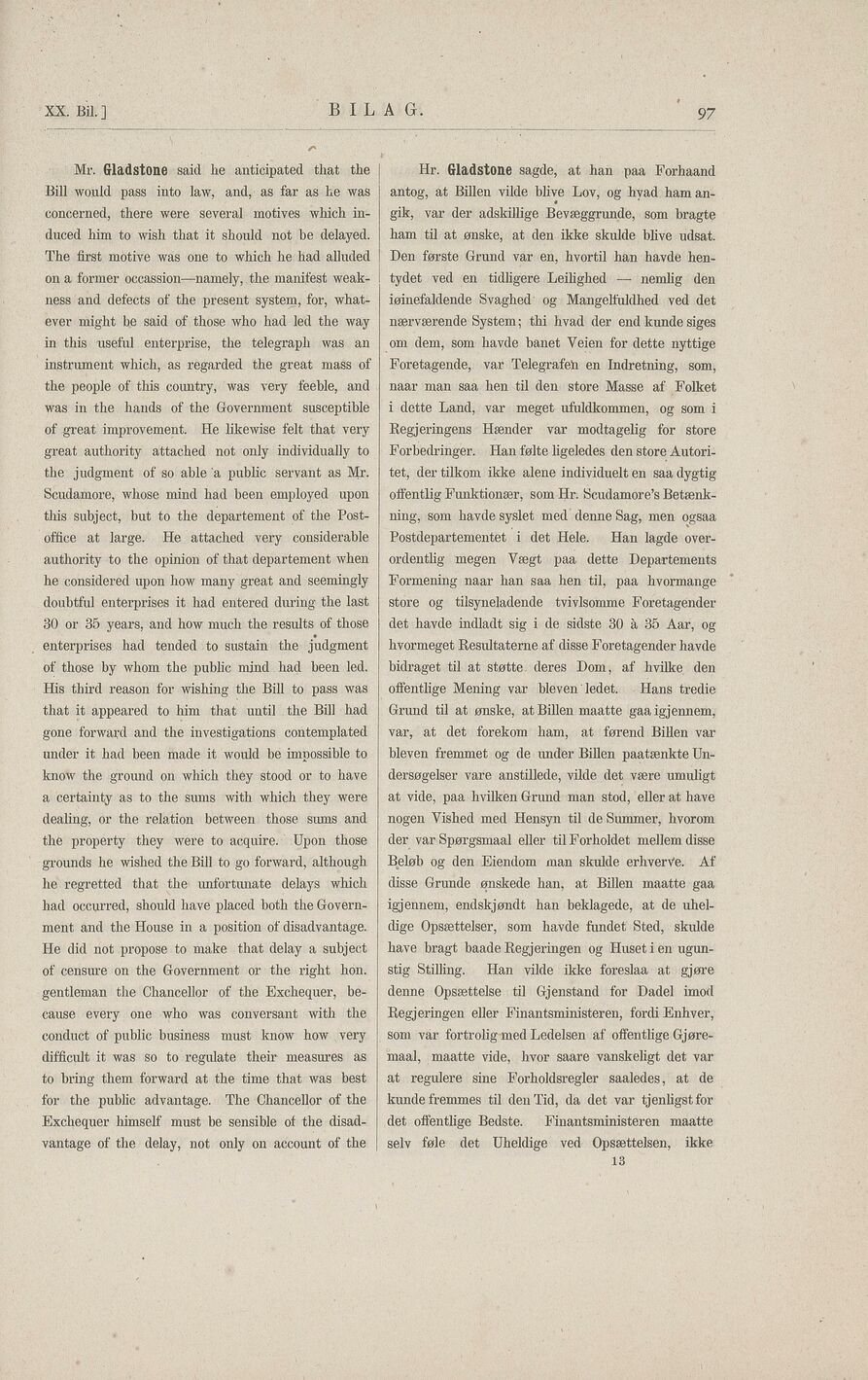
Full resolution (JPEG) - On this page / på denna sida - Bilag - XX. Uddrag af Forhandlinger i det engelske Parliament om Telegrafbillen. Tirsdagen den 21de Juli 1868. (Efter Times af 22de Juli 1868)

<< prev. page << föreg. sida << >> nästa sida >> next page >>
Below is the raw OCR text
from the above scanned image.
Do you see an error? Proofread the page now!
Här nedan syns maskintolkade texten från faksimilbilden ovan.
Ser du något fel? Korrekturläs sidan nu!
This page has never been proofread. / Denna sida har aldrig korrekturlästs.
Mr. Gladstone said he anticipated that the
Bill would pass into law, and, as far as he was
concerned, there were several motives which in
duced him to wish that it should not be delayed.
The first motive was one to which he had alluded
on a former occassion—namely, the manifest weak
ness and defects of the present system, for, what
ever might be said of those who had led the way
in this useful enterprise, the telegraph was an
instrument which, as regarded the great mass of
the people of this country, was very feeble, and
was in the hands of the Government susceptible
of great improvement. He likewise felt that very
great authority attached not only individually to
the judgment of so able a public servant as Mr.
Scudamore, whose mind had been employed upon
this subject, but to the departement of the Post
office at large. He attached very considerable
authority to the opinion of that departement when
he considered upon how many great and seemingly
doubtful enterprises it had entered during the last
30 or 35 years, and how much the results of those
enterprises had tended to sustain the judgment
of those by whom the public mind had been led.
His third reason for wishing the Bill to pass was
that it appeared to him that uutil the Bill had
gone forward and the investigations contemplated
under it had been made it would be impossible to
know the ground on which they stood or to have
a certainty as to the sums with which they were
dealing, or the relation between those sums and
the property they were to acquire. Upon those
grounds he wished the Bill to go forward, although
he regretted that the unfortunate delays which
had occurred, should have placed both the Govern
ment and the House in a position of disadvantage.
He did not propose to make that delay a subject
of censure on the Government or the right hon.
gentleman the Chancellor of the Exchequer, be
cause every one who was conversant with the
conduct of public business must know how very
difficult it was so to regulate their measures as
to bring them forward at the time that was best
for the public advantage. The Chancellor of the
Exchequer himself must be sensible of the disad
vantage of the delay, not only on account of the
Hr. Gladstone sagde, at han paa Forhaand
antog, at Billen vilde blive Lov, og hyad ham an
gik, var der adskillige Bevæggrunde, som bragte
ham til at ønske, at den ikke skulde blive udsat.
Den første Grund var en, hvortil han havde hen
tydet ved en tidligere Leilighed — nemlig den
iøinefaldende Svaghed og Mangelfuldhed ved det
nærværende System; thi hvad der end kunde siges
om dem, som havde banet Veien for dette nyttige
Foretagende, var Telegrafeh en Indretning, som,
naar man saa hen til den store Masse af Folket
i dette Land, var meget ufuldkommen, og som i
Regjeringens Hænder var modtagelig for store
Forbedringer. Han følte ligeledes den store Autori
tet, der tilkom ikke alene individuelt en saa dygtig
offentlig Funktionær, som Hr. Scudamore’s Betænk
ning, som havde syslet med denne Sag, men ogsaa
Postdepartementet i det Hele. Han lagde over
ordentlig megen Vægt paa dette Departemeuts
Formening naar han saa hen til, paa hvormange
store og tilsyneladende tvivlsomme Foretagender
det havde indladt sig i de sidste 30 a 35 Aar, og
hvormeget Resultaterne af disse Foretagender havde
bidraget til at støtte deres Dom, af hvilke den
offentlige Mening var bleven ledet. Hans tredie
Grund til at ønske, at Billen maatte gaa igjennem,
var, at det forekom ham, at førend Billen var
bleven fremmet og de under Billen paatænkte Un
dersøgelser vare anstillede, vilde det være umuligt
at vide, paa hvilken Grund man stod, eller at have
nogen Yished med Hensyn til de Summer, hvorom
der var Spørgsmaal eller til Forholdet mellem disse
Beløb og den Eiendom man skulde erhverVe. Af
disse Grunde ønskede han, at Billen maatte gaa
igjennem, endskjøndt han beklagede, at de uhel
dige Opsættelser, som havde fundet Sted, skulde
have bragt baade Regjeringen og Huset i en ugun
stig Stilling. Han vilde ikke foreslaa at gjøre
denne Opsættelse til Gjenstand for Dadel imod
Regjeringen eller Finantsministeren, fordi Enhver,
som var fortrolig med Ledelsen af offentlige Gjøre
maal, maatte vide, hvor saare vanskeligt det var
at regulere sine Forholdsregler saaledes, at de
kunde fremmes til den Tid, da det var tjenligstfor
det offentlige Bedste. Finantsministeren maatte
seiv føle det Uheldige ved Opsættelsen, ikke
203
BILAG
XX. Bil. ]
<< prev. page << föreg. sida << >> nästa sida >> next page >>